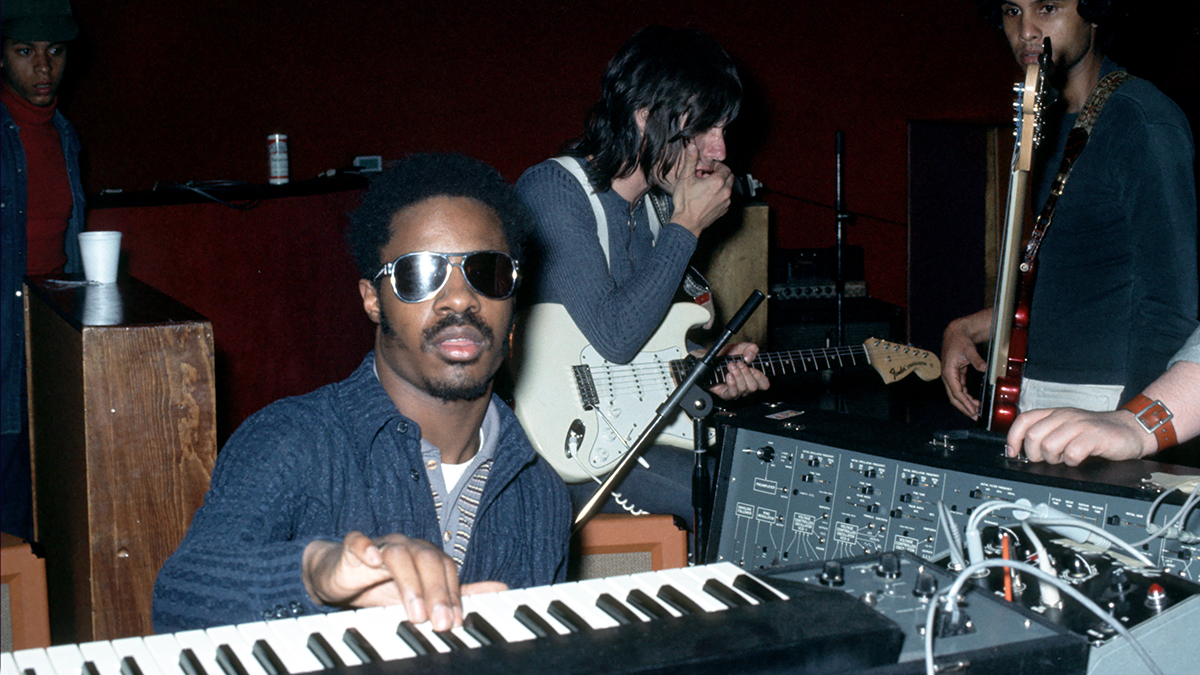The creative partnership between Stevie Wonder and TONTO synth creators Malcolm Cecil and Robert Margouleff is the stuff of legend. Their collaborations resulted in a series of seminal albums, starting in 1972 with Music of my Mind, and in a lengthy interview with Anthony Marinelli, Margouleff has been discussing their first meeting, how they recorded and why Superstition was almost given to Jeff Beck.
Margouleff says that Wonder sought him and Cecil out after hearing their 1971 album, Zero Time. In fact, as Margouleff remembers it, Wonder actually turned up at their studio with a copy of the record under his arm.
“Stevie came in and we showed him the instrument [TONTO] and he put his hands all over it,” he recalls. “And then he started trying to play chords on it and he said ‘Malcolm! Bob! What’s wrong with this instrument? It only plays one note at a time!’”
After explaining that the version of TONTO that Wonder was playing was monophonic, Margouleff says, “Stevie got it in a second. We started recording that weekend - we recorded like 15 or 16 songs. We went completely bonkers.”
This was around the time that Wonder was in the process of renegotiating his contract with Motown, having allowed his original deal to expire when he turned 21.
“He was sick of Motown,” says Margouleff. “Why? Because there was a formula for Motown - it had four guys dancing in sort of uniforms and a front person, male or female. It was a formula and Stevie didn’t want to be inside the formula. And also, his music was so socially significant and important it wasn’t just about ‘do-bop’ and ‘how I love you baby.’”

Wonder would eventually re-sign with Motown under significantly improved terms, but despite his prolificacy with Cecil and Margouleff, there was initially no specific goal.
“We never recorded music to create an album, so to speak. We just recorded music and we had a huge library of music, all in different kinds of places,” says Margouleff. “He would come in with some fragments. Some songs he had in his head for 10 years but he didn’t want to have them published by Motown.”
Margouleff says that, initially, he and Cecil were fitting their sessions with Wonder in around other projects that they did to pay the bills. In fact, their Stevie time was typically from 7pm until well into the night.
“With Steve we just got busier and busier and busier,” Margouleff remembers, until they switched to working with him full-time which meant giving up their day jobs. “He gave us enough cake to keep the wheels turning,” is how Margouleff describes their financial arrangement.
We’re guessing that there was plenty of cake for everyone after the release of Music of my Mind, and another album, Talking Book, quickly followed. One of the standout tracks on here - and, indeed, from Wonder’s entire career - is Superstition, and Margouleff is happy to tell the tale of how that was almost given to Jeff Beck.
“That was during Electric Lady [Studios] time. Jeff was in town with his band - he’d just come off a tour and Stevie was still on the road. When Stevie came back into town they met each other face to face in the studio. Stevie said ‘if you play on my record [Beck would end up playing guitar on Lookin' for Another Pure Love] I’ll give you a song.’ And first off he was going to give him Superstition, which had already been recorded.”
According to Margouleff, though, the people around Wonder at the time thought this was a bad idea.
“The powers that be, including me and Malcolm, said, ‘Steve, you have to do this song. You cannot give this song to anybody’. But, in the meantime, before that happened, they did a demo of it where Jeff Beck played the drums. And when Berry Gordy heard about that, from what we hear, he said ‘Steve, don’t do that. You need to keep that song for yourself.’”
Everything worked out fine in the end, of course: Stevie gave Beck Cause We’ve Ended As Lovers, which turned up on Beck’s 1975 album, Blow by Blow. Beck would end up releasing a version of Superstition, too… but only after Wonder’s recording had given him a number one hit.
Check out the full interview in the video above.







